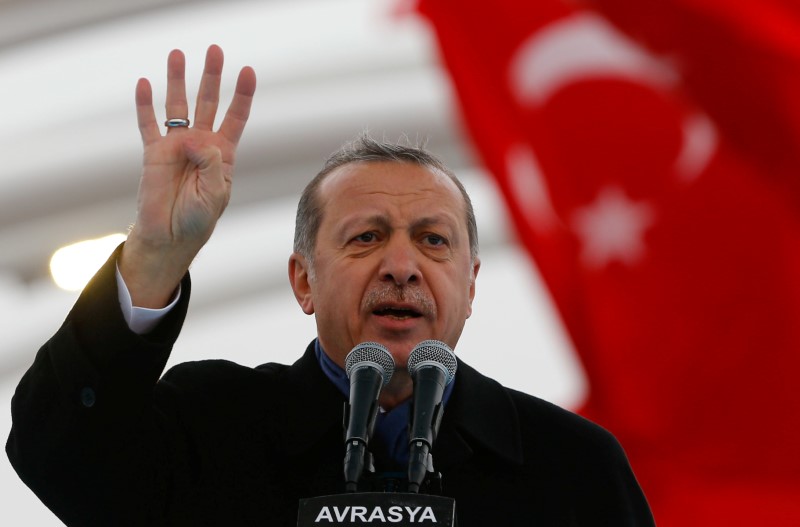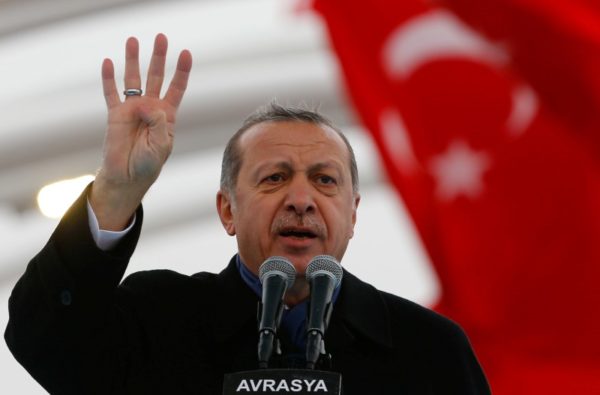
Turkish President Tayyip Erdogan makes a speech during the opening ceremony of Eurasia Tunnel in Istanbul, Turkey, December 20, 2016. REUTERS/Murad Sezer
By: Dorian Jones
Source: VOA News
ISTANBUL — Turkish President Recep Tayyip Erdogan is assuming a mediator role, calling for a display of sensitivity by the U.S., Russia and other nations amid heightened tensions on Syria.
U.S. President Donald Trump has threatened to launch military strikes in response to Saturday’s (April 7) alleged chemical weapons attack by Syrian government forces that killed at least 40.
Erdogan spoke with Russian President Vladimir Putin late Thursday on the phone after a separate call with Trump.
“Erdogan is at the moment the only man who can talk to both of these leaders,” said international relations expert Huseyin Bagci of Ankara Middle East Technical University. “On one side, he [Erdogan] is a close ally of NATO, and on the other side, he is a strategic ally of Russia. Erdogan also has leverage.”
Bagci added that without Turkey, Washington and Moscow would be unable to do many things in Syria.
U.S.-Russian tensions remain high as Ankara tries to mediate.
“A dialogue between the chiefs of staff of the U.S. and Russia has begun,” Russian Parliament Defense Committee Head Vladimir Shamanov said Wednesday. “The connection has been made possible through our counterparts in Turkey,” he added.
NATO Secretary-General Jens Stoltenberg is due to visit Ankara Monday for talks on the Syrian crisis.
Ankara has also been deepening its relations with Moscow. Last week Erdogan hosted Putin and Iranian president Hasan Rouhani to discuss efforts to resolve the Syrian civil war under the so-called “Astana Process.”
Analysts say Ankara, which is hosting over 3 million Syrian refugees at a cost of $30 billion, will be concerned any U.S.-led attack on Syria could derail efforts to end that country’s war.
“The perpetrators [for the chemical attack] should pay the price. But while doing that, there should not be steps that would damage Turkey, Russia and Iran’s efforts for a lasting peace,” said Turkish Prime Minister Binali Yildirim on Friday.
Adding to Turkish concerns over any U.S.-led attack is that Turkish forces are currently deployed in Syria, fighting against the YPG Kurdish militia, deemed as terrorists by Ankara.
“Erdogan is trying to de-escalate a situation that has left Turkey caught in the middle and in a difficult place,” said political columnist Semih Idiz of the al-Monitor website.”I think this is what this meditation exercise is about. Any U.S.-led attack could really disrupt Ankara’s plans against the Syrian Kurdish militia.”
Economic toll
The threat of a further escalation in fighting in Syria has already hit the Turkish economy hard. “The uncertainty in the region is affecting the Turkish lira, which is plummeting,” said Idiz.
“We are about to enter the tourism season,” he noted. “If there is a major confrontation in this part of the world the last thing tourists would want to do is to enter, what they believe is a war zone.”
Analysts suggest assuming a new mediation role could also be driven ultimately by Turkey’s strategic interests.
“Turkey would like to be a mediator,” “said Bagci. “It wants to be viewed as trustworthy. It wants to be the consciousness of the Middle East. Whether Turkey will be able to take advantage of this opportunity or not is another matter, but the chance is there.”




